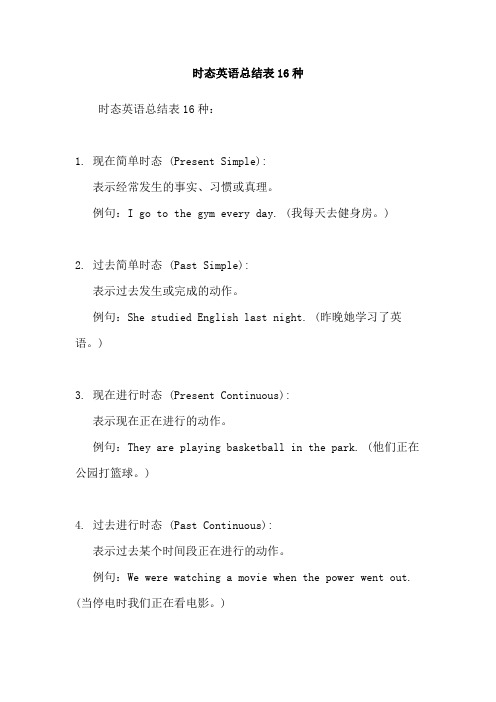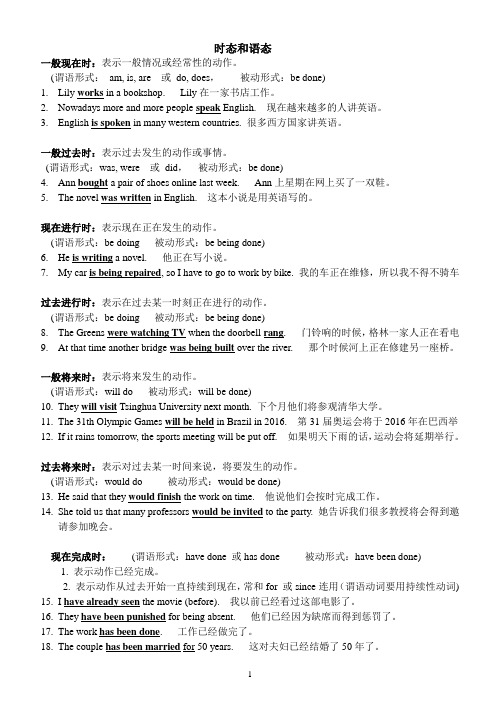时态例句总结
- 格式:pptx
- 大小:94.57 KB
- 文档页数:11

英语16种时态结构及例句如下:1、一般现在时(do/does;is/am/are)。
例:He is a student.他是一个学生。
2、现在进行时(am/is/are doing)。
例:He is listning to the music now.他现在正在听音乐。
3、过去进行时(was/ were doing)。
表示在过去一个具体的时间正在发生的动作。
例:Mary was listening to light music 10 minutes ago.10分钟前,玛丽正在听轻音乐。
4、一般将来时。
基本结构是will do。
例:We will send her a glass hand-made craft as her birthday gift.我们将送给她一个玻璃的手工制品,作为给她的生日礼物。
5、将来进行时(will be doing)。
强调在将来的某个具体时间正在发生的动作或存在的状态。
例:Don't worry, you won't miss her. She will be wearing a red T-shirt and a white skirt at that time.别担心,你不会认不出她的。
她到时会穿一件红色的T恤衫和一条白色的短裙。
6、过去将来时(would do)。
表示从过去的某个时间看将要发生的事。
例:I said on Thursday I should see my friend the next day.我星期四说我将于第二天拜访我的朋友。
7、过去将来进行时(would be doing)。
强调在过去将来的某个具体时间正在发生的动作或存在的状态。
例:The government promised that a new highway would be being built next July.政府承诺说第二年7月将有一条新的高速公路正在修建。

英语十六时态总结英语是一门广泛使用的语言,在学习英语时,掌握时态是非常重要的一部分。
时态可以用来表示动作或状态发生的时间,而英语中一共有十六种时态。
本文将对这十六种时态进行总结,帮助读者更好地理解和运用。
一、一般现在时(Simple Present Tense)一般现在时表示经常性的动作、客观事实或常事情。
常与时间状语(如:always, usually, often)一起使用。
例句:1. He always goes to work by bus.2. I usually have breakfast at 7 o'clock.3. They often visit their grandparents on weekends.二、一般过去时(Simple Past Tense)一般过去时用来表示过去发生的动作或状态,常与过去的时间状语(如:yesterday, last week, two months ago)搭配使用。
例句:1. She studied English for three hours yesterday.2. We went to the beach last summer.3. He played football when he was young.三、一般将来时(Simple Future Tense)一般将来时表示将来要发生的动作或状态,常与将来的时间状语(如:tomorrow, next week, in a month)一起使用。
也可使用助动词(will)来构成一般将来时。
例句:1. I will meet my friends tomorrow.2. They are going to travel to Europe next month.3. She will send you an email later.四、现在进行时(Present Continuous Tense)现在进行时用来表示现阶段正在进行的动作或状态,通常与现在进行时的标志词(如:now, at the moment)连用。

时态英语总结表例句现在时态(Simple Present Tense):- She lives in New York.- I eat breakfast every morning.- The sun rises in the east.- They always go to the gym after work.过去时态(Simple Past Tense):- He studied in France last year.- We went to the beach yesterday.- The cat chased the mouse, but it escaped.- They played soccer on Saturday.将来时态(Simple Future Tense):- I will see you tomorrow.- They will move to a new house next month.- She is going to take a trip to Europe next summer. - He is leaving for college in two weeks.现在进行时态(Present Continuous Tense):- She is watching television at the moment.- We are studying for the exam.- They are playing soccer in the park.- It is raining outside.过去进行时态(Past Continuous Tense):- I was reading a book when she called.- They were talking about their vacation plans at that time.- The children were playing in the garden all afternoon.- We were watching a movie when the power went out.将来进行时态(Future Continuous Tense):- I will be working late tonight.- They will be traveling to Japan this time next year.- She will be studying for her exams all weekend.- We will be waiting for you at the airport.现在完成时态(Present Perfect Tense):- He has already finished his homework.- We have never been to that restaurant before.- She has lived in this city for ten years.- They have seen that movie three times.过去完成时态(Past Perfect Tense):- I had already eaten dinner before he arrived.- They had finished their work by the time I got there.- She had studied French for two years before moving to France. - We had seen that movie twice before it was released.将来完成时态(Future Perfect Tense):- They will have completed the project by the end of the month.- I will have finished my degree by the time you graduate.- She will have traveled to five different countries by the end of the year.- We will have known each other for ten years by next summer.。

英文表格中短语的时态英语16种时态表格总结加例句1.一般现在时:do①表经常发生的动作I always help others(我常帮助他人)②表客观事实、真理The sun rises in the east(太阳从东边升起)③表知觉,状态I have a book (我有一本书)2.一般过去时:did表过去的发生的动作,状态或习惯I saw him yesterday(昨天我看到了他)3.一般将来时:will do表将来发生的动作或状态He will live in a big city(他将居住在大城市)注意:有连词when、unless、if、once所引导的状语从句表某条件时,一定要用一般现在时,而主句用一般将来时4.进行时现在进行时:be(is、am、are)doing过去进行时:was/were doing将来进行时:will be doing现在进行时:be(is、am、are)doing表示现在时刻正在进行的动作He is writing a letter.(他正在写一封信)5.过去进行时:was/were doing表过去某时刻正在进行的动作He was taking a bath when you called.(你打电话来时他正在洗澡)6.将来进行时:will be doing表将来某个时间正在发生的动作This time next day they will be sitting in the cinema.(明天这个时候他们会坐在电影院里)7.完成时现在完成时:have/has done过去完成时:had done将来完成时:will have done现在完成时:have/has done(过去分词)完成状态:用以表示到现在为止完成的动作(动作不延续,瞬间完成或时间很短)She has already come (她已经来了)未完成状态:用以表示过去某一时间开始到现在为止仍在继续的动作或状态(适用于延续性的动作)She has livedhere for 10 years. (她已经在这里住了10年了),8.过去完成时:had done用以表示截至过去某时为止所完成的动作或状态例1. He had already left when I came.(我来时他已经离开了)注意:过去完成时不能单独存在,要与另一个一般过去时或表过去的副词短语连用,即呈现过去不同时间发生的两个动作,先发生的用过去完成时,后发生的用一般过去时。

时态英语总结表16种时态英语总结表16种:1. 现在简单时态 (Present Simple):表示经常发生的事实、习惯或真理。
例句:I go to the gym every day. (我每天去健身房。
)2. 过去简单时态 (Past Simple):表示过去发生或完成的动作。
例句:She studied English last night. (昨晚她学习了英语。
)3. 现在进行时态 (Present Continuous):表示现在正在进行的动作。
例句:They are playing basketball in the park. (他们正在公园打篮球。
)4. 过去进行时态 (Past Continuous):表示过去某个时间段正在进行的动作。
例句:We were watching a movie when the power went out. (当停电时我们正在看电影。
)5. 现在完成时态 (Present Perfect):表示过去发生的动作对现在有影响或仍然持续。
例句:He has lived in London for five years. (他在伦敦已经住了五年。
)6. 过去完成时态 (Past Perfect):表示过去某个时间点之前已经完成的动作。
例句:She had already finished her homework before dinner. (晚饭之前她已经完成了作业。
)7. 将来简单时态 (Future Simple):表示将来要发生的动作。
例句:I will visit my grandparents next weekend. (我下个周末要去看望我的祖父母。
)8. 现在进行时态 (Future Continuous):表示将来某个时间段正在进行的动作。
例句:They will be studying for their exams tomorrow evening. (他们明天晚上将会在学习备考。

时态和语态一般现在时:表示一般情况或经常性的动作。
(谓语形式:am, is, are 或do, does,被动形式:be done)1.Lily works in a bookshop. Lily在一家书店工作。
2.Nowadays more and more people speak English. 现在越来越多的人讲英语。
3.English is spoken in many western countries. 很多西方国家讲英语。
一般过去时:表示过去发生的动作或事情。
(谓语形式:was, were 或did,被动形式:be done)4.Ann bought a pair of shoes online last week. Ann上星期在网上买了一双鞋。
5.The novel was written in English. 这本小说是用英语写的。
现在进行时:表示现在正在发生的动作。
(谓语形式:be doing 被动形式:be being done)6.He is writing a novel. 他正在写小说。
7.My car is being repaired, so I have to go to work by bike. 我的车正在维修,所以我不得不骑车过去进行时:表示在过去某一时刻正在进行的动作。
(谓语形式:be doing 被动形式:be being done)8.The Greens were watching TV when the doorbell rang. 门铃响的时候,格林一家人正在看电9.At that time another bridge was being built over the river. 那个时候河上正在修建另一座桥。
一般将来时:表示将来发生的动作。
(谓语形式:will do 被动形式:will be done)10.They will visit Tsinghua University next month. 下个月他们将参观清华大学。
十六种时态例句时态是语法中非常重要的一个概念,它用于表示动作或状态在时间上的不同情况。
在英语中,常见的时态包括过去时、现在时和将来时,而每一种时态又可以分为简单、进行、完成和完成进行四种形式。
下面将介绍十六种常见时态,并给出一些例句来帮助理解和运用。
1. 过去简单时(Simple Past):过去简单时用于表示过去发生的动作或状态,通常和表示过去的时间状语连用。
例句:They went to the zoo yesterday.(他们昨天去了动物园。
)2. 现在简单时(Simple Present):现在简单时用于表示经常性、习惯性的动作或客观事实。
例句:She loves watching movies.(她喜欢看电影。
)3. 将来简单时(Simple Future):将来简单时用于表示将来要发生的动作或状态。
例句:I will go to school tomorrow.(我明天将去学校。
)4. 过去进行时(Past Continuous):过去进行时用于表示过去某个时间点正在进行的动作。
例句:She was reading a book last night.(昨晚她正在看书。
)5. 现在进行时(Present Continuous):现在进行时用于表示现在正在进行的动作。
例句:They are playing soccer now.(他们现在正在踢足球。
)6. 将来进行时(Future Continuous):将来进行时用于表示将来某个时间点正在进行的动作。
例句:I will be studying at this time tomorrow.(明天这个时间我将在学习。
)7. 过去完成时(Past Perfect):过去完成时用于表示过去的过去已经发生的动作。
例句:He had finished his homework before dinner.(他在吃晚饭前已经完成了作业。
)8. 现在完成时(Present Perfect):现在完成时用于表示过去发生但与现在有关的动作或状态。
1. 一般现在时:I play basketball every day.2. 现在进行时:She is watching TV right now.3. 一般过去时:He went to the store yesterday.4. 过去进行时:They were playing soccer when it started raining.5. 现在完成时:I have finished my homework.6. 过去完成时:She had already eaten dinner when I arrived.7. 将来进行时:They will be studying for their exams all night.8. 将来完成时:By this time next year, he will have graduated from college.9. 现在完成进行时:I have been studying English for three years.10. 过去完成进行时:They had been waiting for the bus for an hour when it finally arrived.11. 一般将来时:I will go to the gym tomorrow.12. 将来进行时:We will be traveling to Europe next month.13. 一般过去将来时:He said he would call me later that day.14. 过去将来进行时:She knew they would be waiting for her at the airport when she landed.15. 现在完成将来时:I will have finished my project by the end of the week.16. 过去完成将来时:She had hoped they would be able to come to her wedding, but they couldn't make it.。
一、一般现在时例句:It seldom snows here.He is always ready to help others.Action speaks louder than words.二、一般过去时例句:She often came to help us in those days.I didn't know you were so busy.三、现在进行时例句:How are you feeling today?He is doing well in his lessons.四、过去进行时例句:At that time she was working in a PLA unit.When he came in, I was reading a newspaper.五、现在完成时例句:I've written an article.The countryside has changed a lot in the past few years.六、过去完成时例句:As soon as we got to the station, the train had left. By the end of last month. We had reviewed four books.七、一般将来时例句:They are going to have a competition with us in studies.It is going to rain.八、过去将来时例句:He said he would go to Beijing the next day.I asked who was going there.九.将来完成时例句:By the time you get back,great changes will have taken place in this area.初中阶段只需要掌握以上这些。
各种时态例句1. 一般现在时:我妈就像个超级侦探,她总是能发现我藏在枕头底下的小零食。
2. 一般现在时:我那朋友好似一个树懒,每天都慢悠悠的,做啥事都不着急。
3. 一般现在时:我们老板仿佛是个永动机,整天都在那唠唠叨叨,精力无穷。
4. 一般过去时:昨天我爸做菜像打仗一样,那厨房被弄得像个硝烟弥漫的战场。
5. 一般过去时:上星期我去爬山,我累得像条被抽干水的咸鱼,一步都不想动了。
6. 一般过去时:以前我同桌写字慢得像蜗牛爬,每次考试都写不完卷子。
7. 一般将来时:明天我要去逛街,我肯定会像脱缰的野马一样在商场里狂奔。
8. 一般将来时:后天我打算打扫房间,那时候我的房间会像被龙卷风席卷过一样干净。
9. 一般将来时:下星期我要见我对象,我可能会紧张得像个第一次上台的小丑。
10. 现在进行时:我现在吃冰淇淋吃得像个贪婪的小怪兽,一口接一口。
11. 现在进行时:我正在看小说,我入迷得就像一只掉进蜜罐的小蚂蚁,拔不出来了。
12. 现在进行时:他正在跑步,那速度快得像一阵旋风,感觉要把跑道都卷起来了。
13. 过去进行时:昨天晚上我在写作业的时候,我弟弟吵闹得像一群叽叽喳喳的麻雀,让我烦死了。
14. 过去进行时:上周末我在钓鱼的时候,那鱼狡猾得像个小妖精,怎么都不上钩。
15. 过去进行时:当时我在打扫卫生,灰尘多得像下雪似的,搞得我灰头土脸。
16. 将来进行时:明天这个时候我将在睡觉,会睡得像个冬眠的熊,谁都叫不醒。
17. 将来进行时:后天上午我将会在考试,那时我可能紧张得像个拉满弦的弓箭,随时会崩断。
18. 将来进行时:下周末我将在旅行,我会快乐得像个在云端飞翔的小鸟。